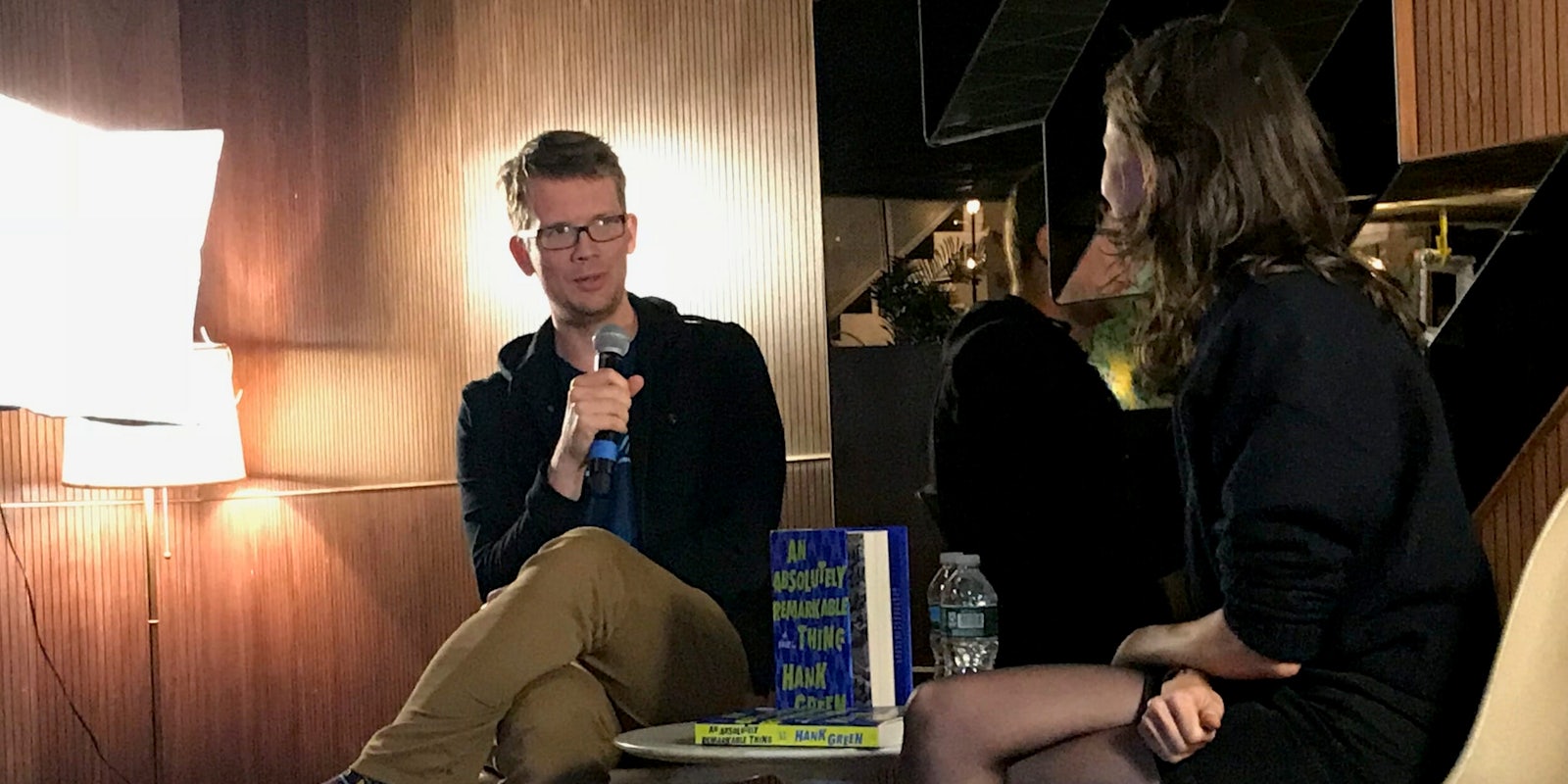Hank Green has been a YouTube fixture for years. But in his first novel, An Absolutely Remarkable Thing, he dives into the darker aspects of online fame and his own relationship with the internet.
An Absolutely Remarkable Thing follows April May, a 23-year-old who’s launched into virality practically overnight after she discovers a massive sculpture in New York City and her friend posts a video. She discovers first-hand what becoming suddenly famous does to her, the people in her life, and what it means when she’s still trying to figure out who she is. Green is also aware of how measurably different it is for women online and how the world views them, which he ties into April’s story. (He’s already written about 30,000 words of a sequel.)
As Green put it, it’s a very fitting book for right now.
He spoke at length with Kristen Sieh—who recorded the audiobook for An Absolutely Remarkable Thing—during a Scribd Chat in New York City ahead of the book’s release on Monday. Green touched on several aspects of the book, out this month, from his writing process to how he and other creators he knows grapple with fame for making things online.
And Green would know a thing or two about that. He’s one half of Vlogbrothers (the vlogging channel he’s run with his older brother, author John Green, since 2007); launched a series of free educational courses on YouTube through Crash Course and SciShow that are used in classrooms; runs a production company; he co-founded VidCon. He’s been putting out those videos for years and has built a rapport with fans, so he knows that if he’s having an off day, his viewers will cut him some slack.
“It is weird when you feel this deep responsibility to your audience and you don’t really know what you’re supposed to do with the power that you have—or you don’t even really recognize, you don’t know that you have the power you have,” Green explained. “The mistakes that can be made, and I’ve seen people be affected, of course, very positively by this line of work but also have negative consequences and I wanted to talk about that.”
He was able to figure out who he was before he became famous for making videos on the internet; he had careers before YouTube, got married, was able to settle down, and was 29 the first time someone recognized him. Becoming famous or notorious is much different for someone much younger; he’s witnessed friends who’ve become famous online when they were in their teens or have chosen it as their first career. They’re expected to do the same thing all the time—and are criticized for wanting to change or evolve—and constantly be on.
On top of writing what he knew, it was a conversation he thought it was worth having.
“What honestly it came down to is there was stuff about my relationship with fame, my relationship with my audience, my relationship with the internet, the social internet particularly,” Green said. “Like, I needed to think more about that, and I think that since this is a communications revolution—the like that we have not seen for maybe 500 years—that we all need to think about it more because ultimately, the internet is made of people and we need to do a good job of being citizens of that space.”
Green decided to write a book to log this. He felt like any video he could’ve made on the topic would’ve likely been received with eye rolls and a lack of empathy because it would look like he—as someone with fame—was whining about being famous. With a book and a protagonist like April May to empathize with, the conversation can take place instead of getting derailed by Green as the focal point. Plus, given that many of his videos are on the shorter side (Vlogbrothers videos are mostly four minutes or less), he wouldn’t have been limited by time restraints.
Influence brings power, whether or not people who’ve become famous online have realized it. There’s still a pushback on the legitimacy of online fame, but it’s power dynamics can prove devastating. Green’s seen people who have isolated themselves, become depressed, and ruin relationships as the pressure to do nothing but make videos builds. If all you have is your viewers, it’s almost inevitable that you’ll do something they don’t like or don’t become what they want you to be. It’s even harder when trying to parse online personas from your real persona, although Green argues that none of us “really knows what their true self is.”
Fame can also dehumanize anyone who has it, both the people who seek it willingly and those who are thrust into it because of a news story, according to Green. Good news is, some of those people, especially younger people, have a better idea of what fame is, Green says, and they’ve fostered an empathetic spirit online. The downside is that there’s no shortage of bitter people in power.
“It’s so hard to ask people to be empathetic of the powerful, so I don’t really want to ask it,” Green said. “And I mostly think of this in terms of what do famous people need to do to not indulge in their own fantasies of their weakness because that’s something I really rankle at when people are like, ‘I’m the victim’ and it’s like, ‘No, you’re the powerful person.’ There’s nothing more dangerous than a powerful person who is imagining themselves as being powerless, and boy do we have a problem with that right now.”
